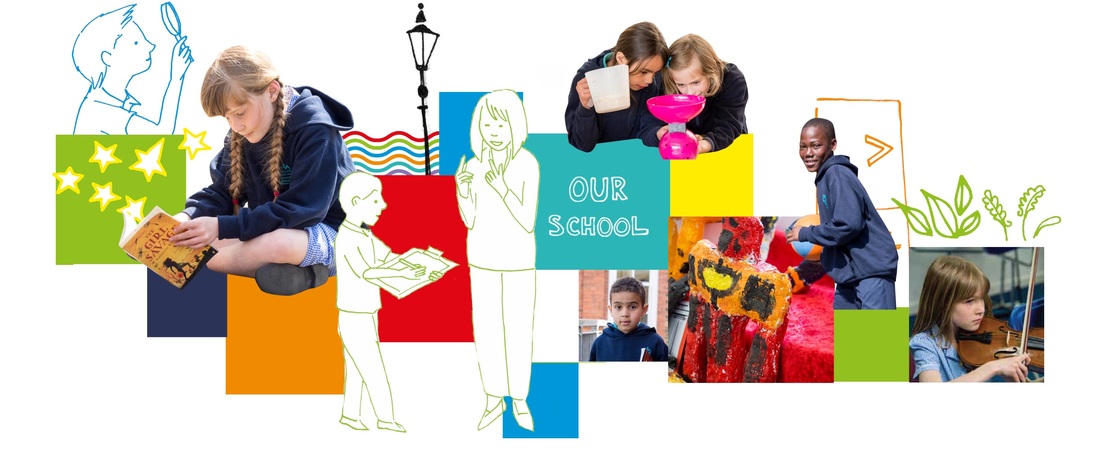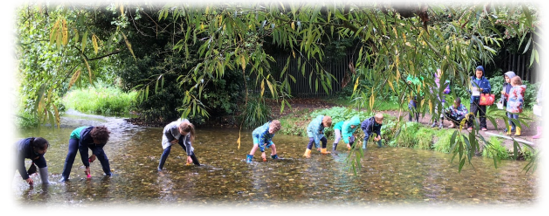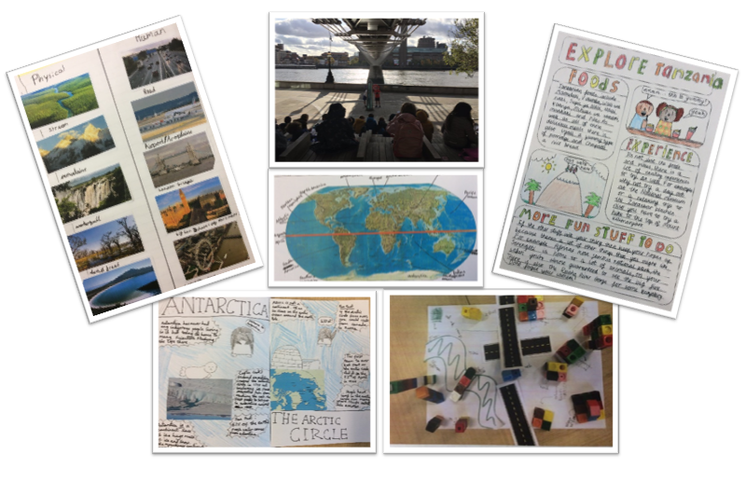Our Curriculum | English | Mathematics |
Science | PSHE | Music | PE | Art | RE | MFL | D&T | Geography | History | Computing | Extra-Curricular |
Science | PSHE | Music | PE | Art | RE | MFL | D&T | Geography | History | Computing | Extra-Curricular |
GEOGRAPHY
Our Vision
Throughout Geography at Dulwich Hamlet Junior School, the children develop a sense of being and wonder about the physical and human world we live in.
As they move up through school, the children journey through a variety of continents, learning about the diversity of people, environments and climates. They are encouraged to think critically and creatively in order to widen their outlook and inspire them to develop a true appreciation of the world. The geographical topics that the children study commonly form the foundations of the cross-curricular learning that takes place, leaving the children with a comprehensive understanding of differing perspectives.
Children also become acquainted with specific geographical concepts and case studies, developing and practising geographical skills which enable them make comparisons between the physical and human features of the area of focus. This will enable them to become not just intuitive and curious geographers but also global citizens who are ready to pursue the subject into Key Stage 3 at a secondary school level and approach travel around the world with a healthy appreciation of regions, countries and cultures.
Concepts and Curriculum
Subject areas are carefully chosen in line with the National Curriculum to ensure children’s knowledge and geographical skills become increasingly more sophisticated, building on learning from previous years. As the children progress through the school and embark on their geography learning, they will build their understanding on the following geographical concepts:
Place - Character, identity, home, community, landscape, diversity
Space - Location, distribution, pattern, interaction, landforms, urban areas
Earth Systems - Physical processes and cycles, dynamic biological and physical changes
Environment and Sustainability - Interactions between human and physical geography, ecosystems, environmental change and impact, sustainability
As the children progress through the school, they embark on a journey around the continents which will widen their outlook and inspire them to develop a true appreciation of the world and environmental issues. Children become progressively more understanding and knowledgeable about the links between the diverse physical features of the world, the humans who live with and use those features and the actions which shape and change them.
Throughout Geography at Dulwich Hamlet Junior School, the children develop a sense of being and wonder about the physical and human world we live in.
As they move up through school, the children journey through a variety of continents, learning about the diversity of people, environments and climates. They are encouraged to think critically and creatively in order to widen their outlook and inspire them to develop a true appreciation of the world. The geographical topics that the children study commonly form the foundations of the cross-curricular learning that takes place, leaving the children with a comprehensive understanding of differing perspectives.
Children also become acquainted with specific geographical concepts and case studies, developing and practising geographical skills which enable them make comparisons between the physical and human features of the area of focus. This will enable them to become not just intuitive and curious geographers but also global citizens who are ready to pursue the subject into Key Stage 3 at a secondary school level and approach travel around the world with a healthy appreciation of regions, countries and cultures.
Concepts and Curriculum
Subject areas are carefully chosen in line with the National Curriculum to ensure children’s knowledge and geographical skills become increasingly more sophisticated, building on learning from previous years. As the children progress through the school and embark on their geography learning, they will build their understanding on the following geographical concepts:
Place - Character, identity, home, community, landscape, diversity
Space - Location, distribution, pattern, interaction, landforms, urban areas
Earth Systems - Physical processes and cycles, dynamic biological and physical changes
Environment and Sustainability - Interactions between human and physical geography, ecosystems, environmental change and impact, sustainability
As the children progress through the school, they embark on a journey around the continents which will widen their outlook and inspire them to develop a true appreciation of the world and environmental issues. Children become progressively more understanding and knowledgeable about the links between the diverse physical features of the world, the humans who live with and use those features and the actions which shape and change them.
Fieldwork opportunities
Pupils also develop and practice fieldwork skills which enable them to develop comparisons between the place of study and the world around them. Through the learning of their own lived experiences, the children are able to deepen their understanding of the interconnectedness of the world we live in and the importance of appreciation and empathy to our environment.
Pupils also develop and practice fieldwork skills which enable them to develop comparisons between the place of study and the world around them. Through the learning of their own lived experiences, the children are able to deepen their understanding of the interconnectedness of the world we live in and the importance of appreciation and empathy to our environment.
Two Year 4 pupils explain their understanding of tectonics.
“Because I live in England, I haven’t been to Africa before and I learned a lot about it in Year 5.” Zac, Year 6




